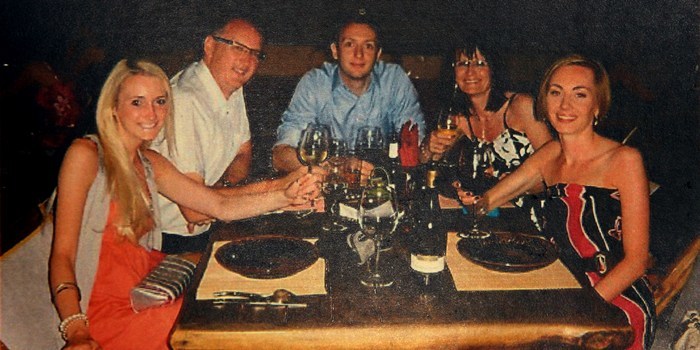Greg McFarlane died in his Edinburgh home of an undiagnosed heart condition just four days before his 27th birthday.
Now the family of the young man, described as “a lovely guy,” have spoken to The Courier in the hope their story might help others.
Speaking from the family home in the Glenfield area of Cowdenbeath, his wife Rose said, “We are very concerned other people are living with undiagnosed heart conditions.
“We had no idea at all there was something wrong he just died very suddenly and that was when we discovered he had this heart condition, which had never been detected. Now we are concerned there are others like him.
“He was a very fit and healthy boy he ran and was always in the gym we think there must be other athletes out there in the same situation,” said Rose, who paid tribute to her husband by saying he was “incredibly good fun, very handsome, very bright, not just clever but bright, with a wicked sense of humour.”
Mr McFarlane was found to have had cardiomegaly, which meant his heart was abnormally large, but Rose, his parents, John and Carol-Anne, and sister Lindy do not know if he had lived with the condition for a long time or if it was a more recent development. “There was no sign at all, there were no symptoms,” Rose said.
October 13 had been a normal morning for the couple, who met four years earlier as they sat at neighbouring desks in the Edinburgh offices of Scottish Widows.
Rose, who works in a managerial role for the company, had left their Edinburgh home earlier than Greg that morning. “We found out when he hadn’t turned up for work,” she said.Life of sportMr McFarlane, who attended Foulford Primary and Beath High schools in Cowdenbeath before heading to Edinburgh University, had enjoyed a lifetime of sport. Mum Carol-Anne said that, away from his schoolwork, her son had been devoted to swimming.
“For many years he swam competitively, first with Dunfermline Amateurs and then with Carnegie Swimming Club, competing for both.”
While he was later to take up both football and running and spend many regular sessions in the gym swimming had been a hugely important part of his life, she said.
“He got into running, and played five and seven-a-sides and was never away from the gym, but his early days were in the pool and he competed all over Scotland.
“He was a fit lad and was well-known in all those circles,” said Carol-Anne, who said her son had been “extremely considerate and caring” and had had a very strong sense of family. His fitness levels make it all the more bewildering why he should have been struck down at such a young age by a heart condition.
Since the tragedy the family have realised they are not alone through finding out about CRY, Cardiac Risk in the Young, which was set up in 1995 to raise awareness of conditions that can lead to sudden cardiac death or sudden death syndrome.
“A friend saw something about it in the paper, and we realised there are other people the same as us,” said Rose.
While still coming to terms with their terrible loss, Mr McFarlane’s close-knit family are determined to ensure his death has not been in vain. “We are still looking into things, but we are making sure we can use it in a good way-maybe a memorial foundation,” said Rose.
His father, John, said that would perhaps take the form of enabling more screening to be carried out for young sportsmen, but said, “We just want to try the best we can. We have not had great discussions with CRY yet-there might be a way for screening and we can explore that, but right now we are still letting it sink in.”
The family were overwhelmed by a collection taken for CRY at Dunfermline Crematorium, where they were joined by Mr McFarlane’s friends and colleagues who gathered to remember him and celebrate his life last week.
Surrounded by scores of cards, the family expressed their deep gratitude for the many messages they had received. “We want to thank everybody,” said John, “Friends, ex-colleagues and present colleagues, friends of Greg from school who he hadn’t seen in years. They have been fantastic.”
Rose added that the support had been “pretty overwhelming.”
Since the tragedy the family have realised they are not alone through finding out about CRY, Cardiac Risk in the Young, which was set up in 1995 to raise awareness of conditions that can lead to sudden cardiac death or sudden death syndrome.
“A friend saw something about it in the paper, and we realised there are other people the same as us,” said Rose.
While still coming to terms with their terrible loss, Mr McFarlane’s close-knit family are determined to ensure his death has not been in vain. “We are still looking into things, but we are making sure we can use it in a good way-maybe a memorial foundation,” said Rose.
His father, John, said that would perhaps take the form of enabling more screening to be carried out for young sportsmen, but said, “We just want to try the best we can. We have not had great discussions with CRY yet-there might be a way for screening and we can explore that, but right now we are still letting it sink in.”
The family were overwhelmed by a collection taken for CRY at Dunfermline Crematorium, where they were joined by Mr McFarlane’s friends and colleagues who gathered to remember him and celebrate his life last week.
Surrounded by scores of cards, the family expressed their deep gratitude for the many messages they had received. “We want to thank everybody,” said John, “Friends, ex-colleagues and present colleagues, friends of Greg from school who he hadn’t seen in years. They have been fantastic.”
Rose added that the support had been “pretty overwhelming.”
